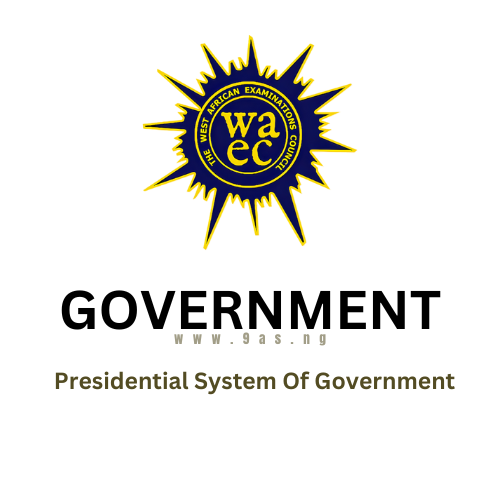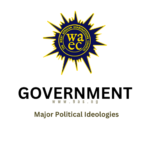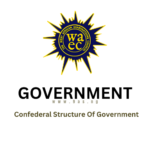THEORY
1. What are the functions of the Head of Government in a presidential system?
2. What factors led to the increasing popularity of the presidential system of government in West Africa?
OBJECTIVES
1. Veto power in a presidential system lies with the
A. Attorney-General.
B. Chief of Army Staff.
C. Executive President.
D. Prime Minister.
2. The system of government in which the president acts as the head of state and the head of government
is
A. diarchy.
B. Presidential.
C. Unitary.
D. parliamentary.
3. In a presidential system of government, the president can constitutionally be removed from the
office through
A. persuasion.
B. impeachment.
C. coup d’etat.
D. vote-of-no-confidence.
4. In which of the following systems of government are ceremonial and executive powers usually fused?
A. Parliamentary.
B. Presidential.
C. Collegial.
D. Confederal.
5. In a presidential system the head of government is called the
A. Prime Minister.
B. Governor-General.
C. Executive President.
D. Chancellor.
6. Which system of government has fusion of ceremonial and executive functions as a feature
A. Presidential.
B. Cabinet.
C. Confederal.
D. Republican.
7. Impeachment as an instrument of check on the Executive is useful mainly in a
A. federal system.
B. cabinet system.
C. unitary system.
D. presidential system.
8. In which system of government are ceremonial and executive powers usually fused?
A. Parliamentary.
B. Federal.
C. Presidential.
D. Democratic.
9. One of the main principles of the presidential system is the
A. parliamentary supremacy.
B. separation of powers.
C. creation of local governments.
D. collective responsibility.
10. Impeachment and veto powers are features of the
A. parliamentary system.
B. unitary system.
C. theocratic system.
D. presidential system.
11. Under a presidential system of government, the chief executive is accountable to the
A. Legislature.
B. Executive.
C. Judiciary.
D. Electorate.
12. In the presidential system of government, the president is responsible to the
A. legislature.
B. judiciary.
C. electorate.
D. military.
13. The executive and ceremonial powers are exercised by the head of state in a
A. unitary system
B. federal system.
C. presidential system.
D. confederal system.
14. Presidential system of government allows the
A. President to be a member of the legislature.
B. Executive to be members of the Legislature.
C. Judiciary to be a part of the Executive.
D. President to select ministers from outside the Legislature.
15. Which of the following principles is emphasized among the three organs of government in a
presidential system?
A. Separation of powers.
B. Centralization.
C. Delegated legislation.
D. Political participation.
16. If a member of the legislature is appointed a Minister, he forfeits his seat in the legislature. This is a feature of the
A. presidential system of government.
B. parliamentary system of government.
C. communist system of government.
D. feudal system of government.
17. Which of the following statements about the presidential system is false?
A. The constitution is supreme.
B. Existence of official opposition.
C. The president is popularly elected.
D. Ministers are not members of parliament.
18. In the presidential system of government, the chief executive is responsible the
A. judiciary.
B. monarch.
C. electorate
D. senate.
19. In a presidential system of government, legislative approval is not necessary for the
A. appointment of Supreme Court judges.
B. ratification of treaties.
C. granting of pardons.
D. appointment of civil servant
20. Impeachment process is a unique feature of the
A. parliamentary system.
B. presidential system.
C. federal system.
D. unitary system.
21. Which of the following systems of government does not practice collective responsibility?
A. Cabinet system
B. Executive system
C. Non-centralized system.
D. Communalism system.



